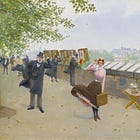If, after reading an installment or two of Pardon My French, you find yourself inspired to visit a French-speaking country, please be careful. I hear that France is full of ‘savage strawberries’ [fraises sauvages], ‘savage raspberries’ [framboises sauvages], and, most especially, ‘savage ducks’ [canards sauvages]. Francophone Canada, where all but a handful of moose qualify as orignaux sauvages, poses even greater dangers for the unwary traveler.
Happily, the preceding paragraph tells nothing that is true. Jeremy Bentham would have described it as ‘nonsense on stilts’. David Crowther, poet laureate of Loughborough, might call it a ‘porky pie’. However, in honor of the lake-loving water birds it mentions, I will file it in the shoe-box marked ‘canard’.
So, Gentle Reader, you may ask how this case of mangled meaning came to be. Did a French word meaning ‘grown without the aid of human hands’ become associated with mayhem after crossing the English Channel? Or, does the Anglophone harbinger of ‘riposte’, ‘reply’, and ‘repartee’ preserve a sinister sense that the language of Jacques Cousteau threw overboard many years ago?
As is the custom here at Extra Muros, my attempt to answer this question began with a visit to the delightfully bookish search engine of the good people at the Hathi Trust. In particular, I asked the gnomes who labor in the bowels of that marvelous machine to provide me with early instances of the expression ‘savage wit’.
In the earliest cases I managed to find, the phrase referred to the crude jests of unlettered villains. (In the first instance, which dated from 1847, these were the Transylvanian captors of a friend of famous frontiersman Daniel Boone.1 In the second, which was written sometime before 1853, the wielder of vulgar witticisms was a crag-dwelling stealer of Scottish sheep.)2
Nor were these forebodings dispelled by the savage mirth over him, amid taunts and sallies of savage wit, while they ironically professed to admire his horse-stealing propensity, slapping him gently on the face with Montgomery's scalp.Good-by! good-by!" said the monster, waving his sword, and laughing immoderately at his own savage wit.Soon after the coining of this phrase, literati in the English-speaking world embraced the notion of the ‘noble savage’ (sauvage noble). (Devotés of this doctrine, which had been coined by Jean-Jacques Rousseau in the previous century, held that human cruelty stemmed chiefly from an excess of civilization. As a result, folk raised in the wild drank deeper draughts of the milk of human kindness than their city-bred counterparts.)
One of these bookmen repurposed the phrase ‘savage wit’ to describe the warm-hearted, barb-free humor of people who lived close to nature.3
Yet genial oft by flash and fit;
High manners, courage mild,
God gave him these, and savage wit
as to an Indian child:Thus, the phrase that once had been used to describe the crude and brutal mockeries of rural reprobates came to mean, if only for a moment, something entirely different. (Sadly, there is no evidence to support the contention that Henry Wadsworth Longfellow, the author of the Song of Hiawatha, referred to the little jokes told by eponymous hero of that tale as ‘mini hahahs’.)
Alas, the kindler, gentler construction of ‘savage wit’ could not compete with the alternative meaning that emerged in the 1860s. When used in this third sense, ‘savage wit’ described the cultivated cruelty of the wig-wearing, coffee-swilling satirists of the century that followed the Glorious Revolution of 1688.
At first, the painfully Bostonian gentlemen who described the erudite stiletti of Andrew Marvel and Alexander Pope sprinkled their accounts with hints of disapproval. However, as early as 1870, a doctor of laws charged with the schooling of future schoolmarms felt sufficiently free of such scruples to characterize the ‘bitter irony, fierce sarcasm, and savage wit’ of Jonathan Swift as a means of combatting ‘the pretentious claims of king, court, and people’.4
For Further Reading:
To Share, Subscribe, or Support:
John Wesley Monette History of the Discovery And Settlement of the Valley of the Mississippi (New York: Harper & Brothers, 1846) page 67
John Mackay Wilson and Alexander Leighton. Wilson's Tales of the Borders And of Scotland: Historical, Traditionary, And Imaginative (Edinburgh: W.P. Nimmo, 1857) Volume XVI, page 73
Frederick Goddard Tuckerman ‘A Soul that out of Nature’s Deep’ Poems (Boston: Ticknor and Fields, 1864) page 57
Ephraim Hunt, LLD Literature of the English Language (New York: Ivison, Blakeman, Taylor, and Company, 1870) page 483







These aren’t the strawberries 🍓 you’re looking for Captain Queeg
Not far from my home here in Texas, there is a winery which features a blend known as Fleur Sauvage. Although (almost) everything is bigger and better in Texas, I can assure one and all that this wine is nothing to be afraid of.